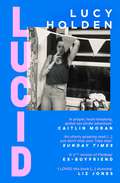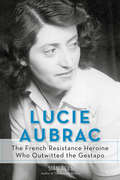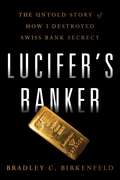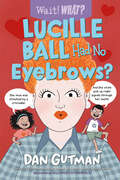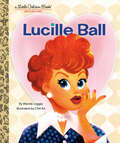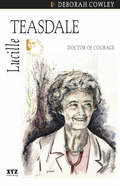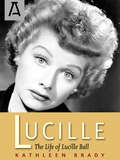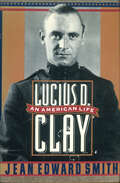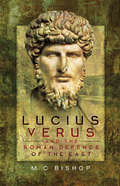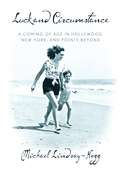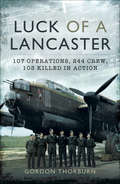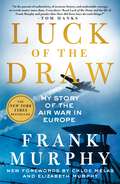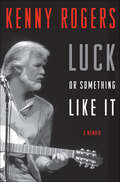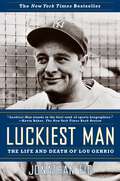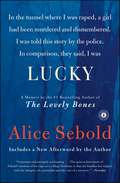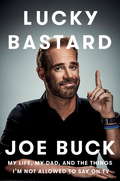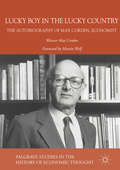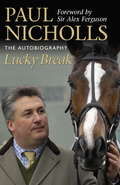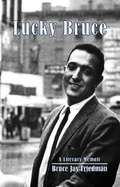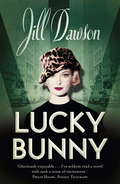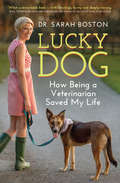- Table View
- List View
Lucid: A memoir of an extreme decade in an extreme generation
by Lucy Holden'In Bath I lay in a field with headphones on, drunk, and staring at an empty blue sky that reflected nothing of the chaos in the world. Below the fields flashed the seaweed-green of a London train and I imagined my former life at the end of it but felt more like it had been tied to the tracks and careered over at 100 mph.' After a wild decade of hedonistic city life that veered violently into trauma, Lucy Holden was thrown back down the ladder to her parents&’ house in a pandemic which paused the parties and forced her to ask herself how she&’d become who she&’d become? Grown-up, broken-down, completely lost, then locked-in – Lucy realises she can&’t make it up as she goes along forever and instead has to confront the darkness she&’s been running from her entire adult life. In this raw, hilarious and often emotional memoir about a young woman asking herself how long she has until her act cracks completely, the mental health of a fast-paced world that never sits still is called into question. With charm and wit, Lucid addresses what it means to be young in today&’s society – and where we can go from here.
Lucie Aubrac: The French Resistance Heroine Who Outwitted the Gestapo
by Siân ReesBrilliant, intensely political, and inseparable for nearly 70 years, Lucie Aubrac and her husband, Raymond, are legendary figures of the French Resistance. Founding leaders of Libération-Sud, one of the most important resistance movements in France, they ran the underground newspaper Libération and served as couriers, arms carriers, and saboteurs. In 1943, when the Gestapo imprisoned Raymond, Lucie engineered a daring escape plan that brought her face to face with feared Gestapo chief Klaus Barbie. When Raymond was arrested again, Lucie mounted a second astonishing rescue, ambushing the prison van that was transporting him. For the post-war generation, the Aubracs were heroes. However, in 1983, Klaus Barbie made the bombshell claim that the Aubracs had become informers in 1943, betraying their comrades. Although later discredited, the allegations raised questions around the many embellishments and inconsistencies in the tales Lucie weaved around herself. Who was Lucie Aubrac? What did she really do in 1943? Siân Rees's penetrating account--the first English-language biography of this extraordinary woman--provides a long-needed corrective to Lucie Aubrac's own admittedly "impressionistic" memoir and a fascinating exploration of the intersection of history, legend, and mythologizing.
Lucifer's Banker: The Untold Story of How I Destroyed Swiss Bank Secrecy
by Bradley C. BirkenfeldA page-turning real-life thriller, Lucifer's Banker is a fascinating behind-the-scenes look at the secret Swiss high-net worth banking industry and a harrowing account of our government's justice system. Readers will follow Birkenfeld and share his outrage with the incompetence and possible corruption at the Department of Justice, and they will cheer him on as he "hammers" one of the most well-known and powerful banks in the world.
Lucille Ball Had No Eyebrows? (Wait! What? #0)
by Dan GutmanFrom the best-selling author of My Weird School: a new entry in the cheerful and engaging biography series centered on high-interest historic figures. Did you know that Lucille Ball could pick up radio signals through her teeth? Or that her career was almost destroyed because she was a registered Communist? Bet you didn’t know that, as a studio executive, she green-lit both Star Trek and Mission: Impossible! Siblings Paige and Turner have collected some of the most unusual and surprising facts about the beloved actress, from her impoverished childhood and her first forays into the film industry to her marriage with Desi Arnaz and her rise to become both the most prominent actress in television and one of its most successful executives. Narrated by the two spirited siblings and animated by Allison Steinfeld’s upbeat illustrations, Wait! What? Lucille Ball Had No Eyebrows? is an authoritative, accessible, and one-of-a-kind biography infused with Dan Gutman’s signature zany sense of humor.
Lucille Ball: A Little Golden Book Biography (Little Golden Book)
by Wendy LoggiaHelp your little one dream big with a Little Golden Book biography about Lucille Ball--and find out why everyone loves Lucy! It's the perfect introduction to nonfiction for preschoolers.This Little Golden Book about Lucille Ball--television star, comedian, producer, and the first woman to own a major studio--is a celebration of a true trailblazer! It's a great read-aloud for young children, as well as their parents and grandparents who grew up watching and loving I Love Lucy.Look for Little Golden Book biographies about these other inspiring people:Dwayne JohnsonQueen Elizabeth II Barack ObamaSonia Sotomayor Dr. FauciJoe BidenDolly PartonKamala HarrisMisty CopelandBetty WhiteFrida KahloRuth Bader GinsburgJackie RobinsonMartin Luther King Jr.
Lucille Teasdale
by Deborah CowleyCanadian surgeon Lucille Teasdale and her husband founded Lacor Hospital in northern Uganda in 1961. For 35 years the two doctors treated such contagious diseases as malaria, TB, and AIDS, and Teasdale performed thousands of operations under difficult conditions. They lived through civil war, hostage takings, and epidemics. Teasdale received the highest humanitarian awards from the U.N. for her lifes work in Africa.
Lucille: The Life of Lucille Ball
by Kathleen BradyEveryone loved Lucy, the scheming, madcap redhead who ruled television for more than twenty years. In life, however, Lucille Ball presented a far more complex and contradictory personality than was ever embodied by the television Lucy. In Lucille: The Life of Lucille Ball Kathleen Brady presents the actress as a fully rounded human being, often at odds with the image she presented as an entertainment icon. Brady has gone far beyond the typical celebrity biography to present a funny, unflinching and ultimately moving portrait of Lucille Ball as a performing artist, daughter, mother, friend, colleague, and television mogul. Many think they know the story of Lucille Ball's life, but Brady provides new details and a fresh perspective on this complex woman through a wealth of anecdotes and firsthand accounts. Lucille Ball is revealed not only as a television archetype and influential icon of postwar American culture, but as a driven yet fragile human being who spent her life struggling to create of life of normalcy, but ultimately failed--even as she succeeded in bringing laughter of millions of fans. In researching Lucille, Brady interviewed more than 150 people from her hometown to Hollywood. She spoke with her grade school classmates, and those like Katherine Hepburn and Ginger Rodgers who met her when she arrived in Hollywood in the 1930s. She gained insights from those who knew her before her fame and from those she loved throughout her life. Film, radio and television history come to life with the appearances on these pages of such greats as The Marx Brothers, Buster Keaton, Louis B. Mayer, and of course Desi Arnaz, who march and pratfall through the pages of this outstanding biography.
Lucius D. Clay: An American Life
by Jean Edward SmithSoldier, statesman, logistical genius: Lucius D. Clay was one of that generation of giants who dedicated their lives to the service of this country, acting with ironclad integrity and selflessness to win a global war and secure a lasting peace. A member of the Army's elite Corps of Engineers, he was tapped by FDR in 1940 to head up a crash program of airport construction and then, in 1942, Roosevelt named him to run wartime military procurement. For three years, Clay oversaw the requirements of an eight-million-man army, setting priorities, negotiating contracts, monitoring production schedules and R&D, coordinating military Lend-Lease, disposing of surplus property-all without a breath of scandal. It was an unprecedented job performed to Clay's rigorous high standards. As Eliot Janeway wrote: "No appointment was more strategic or more fortunate."If, as head of military procurement, Clay was in effect the nation's economic czar, his job as Military Governor of a devastated Germany was, as John J. McCloy has phrased it, "the nearest thing to a Roman proconsulship the modern world afforded." In 1945, Germany was in ruins, its political and legal structures a shambles, its leadership suspect. Clay had to deal with everything from de-Nazification to quarrelsome allies, from feeding a starving people to processing vast numbers of homeless and displaced. Above all, he had to convince a doubting American public and a hostile State Department that German recovery was essential to the stability of Europe. In doing so, he was to clash repeatedly with Marshall, Kennan, Bohlen, and Dulles not only on how to treat the Germans but also on how to deal with the Russians. In 1949, Clay stepped down as Military Governor of Germany and Commander of U.S. Forces in Europe. He left behind a country well on the way to full recovery. And if Germany is today both a bulwark of stability and an economic and political success story, much of the credit is due to Clay and his driving vision.Lucius Clay went on to play key roles in business and politics, advising and working with presidents of both parties and putting his enormous organizing skills and reputation to good use on behalf of his country, whether he was helping run Eisenhower's 1952 campaign, heading up the federal highway program, raising the ransom money for the Bay of Pigs prisoners, or boosting morale in Berlin in the face of the Wall. The Berliners in turn never forgot their debt to Clay. At the foot of his West Point grave, they placed a simple stone tablet: Wir Danken Dem Bewahrer Unserer Freiheit- We Thank the Defender of Our Freedom.
Lucius Verus and the Roman Defence of the East
by M.C. Bishop&“The first biography of Marcus Aurelius&’ adopted brother and co-emperor . . . a valuable read for anyone with an interest in Roman history.&”—The NYMAS Review Lucius Verus is one of the least regarded Roman emperors, despite the fact that he was co-ruler with his adoptive brother Marcus Aurelius for nine years until his untimely death. The later sources were strangely hostile to him and modern writers tend to dismiss him, but contemporary writings shine a more favorable light on his accomplishments. His handling of military affairs, particularly the conflict with Parthia after their invasions of Armenia and Syria, deserves a new consideration in the light of a careful reassessment of all the available source material. This volume looks at the upbringing of the boy who lost two fathers, acquired a brother, had his name changed twice, became a general overnight, and commanded the army that defeated one of Rome&’s greatest foes in the 2nd century AD. His rise to power is placed in the context of Rome&’s campaigns in the East and the part played by all—from the ordinary soldiers up to the aristocracy who commanded them—in making Lucius Verus&’s Parthian Wars a success. &“Bishop&’s background is in Roman military archaeology, and where the details of Roman warfare are concerned, he knows his subject matter backwards and forwards . . . For those who wish to understand how the Roman commanders fighting under Verus achieved success in the East, Bishop&’s book can be heartily recommended.&”—Bryn Mawr Classical Review
Luck and Circumstance: A Coming of Age in Hollywood, New York, and Points Beyond
by Michael Lindsay-HoggFrom acclaimed director Michael Lindsay-Hogg (The Normal Heart, The Beatles' Let It Be, Brideshead Revisited, The Rolling Stones Rock and Roll Circus, etc.), son of glamorous Warner's movie star Geraldine Fitzgerald: a magical dreamscape memoir of his boyhood, coming-of-age, and making his way in the worlds of theater, film, and television. Lindsay-Hogg's father, an English baronet from a family whose money came from the China trade, lived in Ireland and was rarely seen by his son. The author's stepfather was the scion of the Isidor Straus fortune, co-owner of R. H. Macy's; Straus went down with the Titanic, and the author's stepfather was, alas, fortune-less. The author's mother, Geraldine Fitzgerald, the redheaded Irish seductress who won instant acclaim as Bette Davis's best friend in Dark Victory and in William Wyler's Wuthering Heights, spent time with Hollywood's elite--Laurence Olivier, Charles Chaplin, and Orson Welles, with whom she worked in New York at the Mercury Theater and in other productions. Lindsay-Hogg writes of how he wented his way into this exotic, mysterious, and seductive world, encountering as a small boy the likes of Marion Davies and William Randolph Hearst, playing hide-and-seek with Olivia de Havilland, serving drinks to Humphrey Bogart, discussing life with Henry Miller. At the book's center, an offhand comment made to Lindsay-Hogg by his mother, when he was sixteen, about talk circulating (false, she claimed) that she had had a romantic relationship with Orson Welles (Fitzgerald and Welles had lived together at his home in Beverly Hills) and that Welles, rumor had it, was Michael's father ("It's not true," she said. "You know how people put two and two together and get three . . ."). That was the end of the conversation. ("It's time for bed . . . You have school in the morning . . ." she said.) For Lindsay-Hogg, it opened up a whole new realm of his life. He was forever changed by the knowing--of not knowing. Interwoven throughout his narrative is the element of questioning who his father was. Was he the patron saint of American pictures, the legendary genius of the twentieth century, Orson Welles, a consistently inconsistent person in Michael's life . . . or was he the man who considered himself Michael's real father? What did his "father" know? What did Welles know? And what did his mother know to be true (she had brought the author up to believe that she always told the truth)? And when would she tell her son what the truth was . . . As Lindsay-Hogg struggled to make sense of it all, questions of missed chances, conversations never had, questions of what is withheld and what is true took root, dogging him, shaping his life . . . questions still, that haunt and inform this moving, deft, and illuminating memoir.From the Hardcover edition.
Luck of a Lancaster: 107 Operations, 244 Crew, 103 Killed in Action
by Gordon ThorburnNo 9 Squadron of Bomber Command converted from the Wellington to the Lancaster in August 1942. W4964 was the seventieth Lanc to arrive on squadron, in mid April 1943. She flew her first op on the 20th, by which time No 9 had lost forty-one of their Lancs to enemy action and another five had been transferred to other squadrons and lost by them. No 9 would soon lose a further thirteen of the seventy. All of the remaining eleven would be damaged, repaired, transferred to other squadrons or training units, and lost to enemy action or crashes except for three which, in some kind of retirement, would last long enough to be scrapped after the war.Only one of the seventy achieved a century of ops or anything like it: W4964 WS-J.Across all squadrons and all the war, the average life of a Lancaster was 22.75 sorties, but rather less for the front-line squadrons going to Germany three and four times a week in 1943 and '44, which was when W4964 was flying her 107 sorties, all with No 9 Squadron and all from RAF Bardney. The first was Stettin (Szczecin in modern Poland), and thereafter she went wherever 9 Squadron went, to Berlin, the Ruhr, and most of the big ops of the time such as Peenemnde and Hamburg. She was given a special character as J-Johnny Walker, still going strong and on September 15 1944, skippered by Flight Lieutenant James Douglas Melrose, her Tallboy special bomb was the only one to hit the battleship Tirpitz.During her career, well over two hundred airmen flew in J. None were killed while doing so, but ninety-six of them died in other aircraft. This is their story, and the story of one lucky Lancaster.
Luck of the Draw: My Story of the Air War in Europe
by Frank MurphyThe epic true story of an American hero who flew during WWII, soon to be featured in the upcoming Steven Spielberg and Tom Hanks TV Series, Masters of the Air. <p><p>Beginning on August 17, 1942, American heavy bomber crews of the Eighth Air Force took off for combat in the hostile skies over occupied Europe. The final price was staggering. 4,300 B-17s and B-24s failed to return; nearly 21,000 men were taken prisoner or interned in a neutral country, and a further 17,650 made the ultimate sacrifice. Luck of the Draw is more than a war story. It’s the incredible, inspiring story of Frank Murphy, one of the few survivors from the 100th Bombardment Group, who cheated death for months in a German POW camp after being shot out of his B-17 Flying Fortress. <p><p>Now with a new foreword written by his granddaughter Chloe Melas, of CNN, and daughter Elizabeth Murphy. <p> <b>New York Times Bestseller</b>
Luck or Something Like It: A Memoir
by Kenny RogersA living legend of Country Music and a worldwide music icon, superstar Kenny Rogers has enjoyed a fascinating five decades in show business, and he tells the full story of his remarkable life and career in Luck or Something Like It. From his days with hit group The First Edition to his sterling solo work, the artist who "knows when to hold 'em and knows when to fold 'em" knows how to tell a captivating life story as well–bringing a golden era of Country Music to life as he recounts his remarkable rise to the top of the charts. An honest, moving, eye-opening view of a musician's life on the road, Luck or Something Like It is the definitive music memoir–a backstage pass to fifty years of performing and recording presented by the one and only Kenny Rogers, one of the bestselling artists ever.
Luckiest Man: The Life and Death of Lou Gehrig
by Jonathan EigThe definitive account of the life and tragic death of baseball legend Lou Gehrig.Lou Gehrig was a baseball legend—the Iron Horse, the stoic New York Yankee who was the greatest first baseman in history, a man whose consecutive-games streak was ended by a horrible disease that now bears his name. But as this definitive new biography makes clear, Gehrig’s life was more complicated—and, perhaps, even more heroic—than anyone really knew. Drawing on new interviews and more than two hundred pages of previously unpublished letters to and from Gehrig, Luckiest Man gives us an intimate portrait of the man who became an American hero: his life as a shy and awkward youth growing up in New York City, his unlikely friendship with Babe Ruth (a friendship that allegedly ended over rumors that Ruth had had an affair with Gehrig’s wife), and his stellar career with the Yankees, where his consecutive-games streak stood for more than half a century. What was not previously known, however, is that symptoms of Gehrig’s affliction began appearing in 1938, earlier than is commonly acknowledged. Later, aware that he was dying, Gehrig exhibited a perseverance that was truly inspiring; he lived the last two years of his short life with the same grace and dignity with which he gave his now-famous “luckiest man” speech. Meticulously researched and elegantly written, Jonathan Eig’s Luckiest Man shows us one of the greatest baseball players of all time as we’ve never seen him before.
Lucky
by Alice SeboldEnormously visceral, emotionally gripping, and imbued with the belief that justice is possible even after the most horrific of crimes, Alice Sebold's compelling memoir of her rape at the age of eighteen is a story that takes hold of you and won't let go. Sebold fulfills a promise that she made to herself in the very tunnel where she was raped: someday she would write a book about her experience. With Lucky she delivers on that promise with mordant wit and an eye for life's absurdities, as she describes what she was like both as a young girl before the rape and how that rape changed but did not sink the woman she later became. It is Alice's indomitable spirit that we come to know in these pages. The same young woman who sets her sights on becoming an Ethel Merman-style diva one day (despite her braces, bad complexion, and extra weight) encounters what is still thought of today as the crime from which no woman can ever really recover. In an account that is at once heartrending and hilarious, we see Alice's spirit prevail as she struggles to have a normal college experience in the aftermath of this harrowing, life-changing event. No less gripping is the almost unbelievable role that coincidence plays in the unfolding of Sebold's narrative. Her case, placed in the inactive file, is miraculously opened again six months later when she sees her rapist on the street. This begins the long road to what dominates these pages: the struggle for triumph and understanding -- in the courtroom and outside in the world. Lucky is, quite simply, a real-life thriller. In its literary style and narrative tension we never lose sight of why this life story is worth reading. At the end we are left standing in the wake of devastating violence, and, like the writer, we have come to know what it means to survive.
Lucky
by Alice SeboldEnormously visceral, emotionally gripping, and imbued with the belief that justice is possible even after the most horrific of crimes, Alice Sebold's compelling memoir of her rape at the age of eighteen is a story that takes hold of you and won't let go.Sebold fulfills a promise that she made to herself in the very tunnel where she was raped: someday she would write a book about her experience. With Lucky she delivers on that promise with mordant wit and an eye for life's absurdities, as she describes what she was like both as a young girl before the rape and how that rape changed but did not sink the woman she later became.It is Alice's indomitable spirit that we come to know in these pages. The same young woman who sets her sights on becoming an Ethel Merman-style diva one day (despite her braces, bad complexion, and extra weight) encounters what is still thought of today as the crime from which no woman can ever really recover. In an account that is at once heartrending and hilarious, we see Alice's spirit prevail as she struggles to have a normal college experience in the aftermath of this harrowing, life-changing event.No less gripping is the almost unbelievable role that coincidence plays in the unfolding of Sebold's narrative. Her case, placed in the inactive file, is miraculously opened again six months later when she sees her rapist on the street. This begins the long road to what dominates these pages: the struggle for triumph and understanding -- in the courtroom and outside in the world.Lucky is, quite simply, a real-life thriller. In its literary style and narrative tension we never lose sight of why this life story is worth reading. At the end we are left standing in the wake of devastating violence, and, like the writer, we have come to know what it means to survive.
Lucky Bastard: My Life, My Dad, and the Things I'm Not Allowed to Say on TV
by Joe BuckThe announcer of this century's most-watched, historic, Chicago Cubs-winning World Series reveals why he is one lucky bastard.Sports fans see Joe Buck everywhere: broadcasting one of the biggest games in the NFL every week, calling the World Series every year, announcing the Super Bowl every three years. They know his father, Jack Buck, is a broadcasting legend and that he was beloved in his adopted hometown of St. Louis.Yet they have no idea who Joe really is. Or how he got here. They don't know how he almost blew his career. They haven't read his funniest and most embarrassing stories or heard about his interactions with the biggest sports stars of this era. They don't know how hard he can laugh at himself--or that he thinks some of his critics have a point. And they don't know what it was really like to grow up in his father's shadow. Joe and Jack were best friends, but it wasn't that simple. Jack, the voice of the St. Louis Cardinals for almost fifty years, helped Joe get his broadcasting start at eighteen. But Joe had to prove himself, first as a minor league radio announcer and then on local TV, national TV with ESPN, and then finally on FOX. He now has a successful, Emmy-winning career, but only after a lot of dues-paying, learning, and pretty damn entertaining mistakes that are recounted in this book.In Lucky Bastard, Joe takes the reader into the broadcast booth and into his childhood home. Hilarious and occasionally heartbreaking, this is a book that any sports fan will love.From the Hardcover edition.
Lucky Bastard: My Life, My Dad, and the Things I'm Not Allowed to Say on TV
by Joe BuckIn this New York Times bestselling memoir, the announcer of the biggest sporting events in the country—including the 2017 Super Bowl and this century's most-watched, historic, Chicago Cubs–winning World Series—reveals why he is one lucky bastard.Sports fans see Joe Buck everywhere: broadcasting one of the biggest games in the NFL every week, calling the World Series every year, announcing the Super Bowl every three years. They know his father, Jack Buck, is a broadcasting legend and that he was beloved in his adopted hometown of St. Louis. Yet they have no idea who Joe really is. Or how he got here. They don’t know how he almost blew his career. They haven’t read his funniest and most embarrassing stories or heard about his interactions with the biggest sports stars of this era. They don’t know how hard he can laugh at himself—or that he thinks some of his critics have a point. And they don’t know what it was really like to grow up in his father’s shadow. Joe and Jack were best friends, but it wasn’t that simple. Jack, the voice of the St. Louis Cardinals for almost fifty years, helped Joe get his broadcasting start at eighteen. But Joe had to prove himself, first as a minor league radio announcer and then on local TV, national TV with ESPN, and then finally on FOX. He now has a successful, Emmy-winning career, but only after a lot of dues-paying, learning, and pretty damn entertaining mistakes that are recounted in this book. In his memoir, Joe takes us through his life on and off the field. He shares the lessons he learned from his father, the errors he made along the way, and the personal mountain he climbed and conquered, all of which have truly made him a Lucky Bastard.
Lucky Boy in the Lucky Country
by Warner Max CordenCorden has written a charming and insightful account of his professional and personal life, from his childhood in Bresiau, Germany, until his retirement in Melbourne, with some closing contemporary thoughts on the revival of protectionism. The book is divided into two parts. Part I considers Corden's early life, from a young boy growing up in Nazi Germany, to his immigration from England to Australia and what that means for the author's self-identify. Part II addresses Corden's work on the Australian Protection Policy for which he is perhaps best known, before reflecting upon the author's time at Oxford University and the Australian National University, and, finally, moving on to review contributions made at the IMF, John Hopkins University, and The World Bank. This book will be of interest to all aspiring economists, as well as established economists familiar with Corden's work. It is an inspiring and profound record of the intellectual journey made by one of Australia's best known economists.
Lucky Break
by Paul NichollsThe revealing and honest autobiography of Britain's leading National Hunt trainer.Paul Nicholls is the former jockey who began training in 1991. Gradually he built up a reputation as one of the most astute and successful trainers in the business, with a special knack for getting it right on the big occasions. His depth of resources meant that on a unique occasion at Wincanton in January 2006, he became the first trainer ever to have six winners on a card. But it is for his role as the trainer of horses such as See More Business, Kauto Star and Denman, all of them Cheltenham Gold Cup winners, that he is best known.In this revealing and honest memoir, Champion Trainer Nicholls explains how he got to the top of his sport, and provides a fascinating insight into his methods and to the horses, jockeys and owners that have helped him achieve so much. Packed with insider stories that all race fans will love, and a foreword from Sir Alex Ferguson, this is without doubt the essential racing book for 2011.
Lucky Break
by Paul NichollsThe revealing and honest autobiography of Britain's leading National Hunt trainer.Paul Nicholls is the former jockey who began training in 1991. Gradually he built up a reputation as one of the most astute and successful trainers in the business, with a special knack for getting it right on the big occasions. His depth of resources meant that on a unique occasion at Wincanton in January 2006, he became the first trainer ever to have six winners on a card. But it is for his role as the trainer of horses such as See More Business, Kauto Star and Denman, all of them Cheltenham Gold Cup winners, that he is best known.In this revealing and honest memoir, Champion Trainer Nicholls explains how he got to the top of his sport, and provides a fascinating insight into his methods and to the horses, jockeys and owners that have helped him achieve so much. Packed with insider stories that all race fans will love, and a foreword from Sir Alex Ferguson, this is without doubt the essential racing book for 2011.
Lucky Bruce
by Bruce Jay Friedman"Like a Twilight zone with Charlie Chaplin"-Mario PuzoWriter, screenwriter, playwright, editor, actor, teacher: Bruce Jay Friedman has done it all, charming the glitziest industries of American golden-age culture for more than half a century. Lucky Bruce is his long-awaited memoir, and it's everything we'd expect and more: here is Friedman at his best, waltzing from Madison Avenue to Hollywood and back again, and reilluminating with brilliant clarity the dazzle of post-war American life.Self-effacing, wry, sharp, and laugh-out-loud funny, Friedman details with lovable candor his friendships and rivalries with the greatest writers, actors, publishers, directors and personalities of the last fifty years. He stands shoulder-to-shoulder with Steve Martin and Woody Allen. He's a dynamo of comedy and a recognized master of American letters. And in Lucky Bruce, whether he's fist-fighting with Norman Mailer, explaining to Richard Pryor why there are so few Jewish junkies, or writing screenplays in a closet with Natalie Wood as his secretary, Friedman is the king of understated charm. With cameos by Joseph Heller, Philip Roth, Mario Puzo, Lillian Hellman, Warren Beatty, Marlene Dietrich, Brian Grazer, Candida Donadio, Crazy Joe Gallo, Joyce Carol Oates, Jack Richardson, Isaac Bashevis Singer, Kurt Vonnegut, and the irreplaceable Elaine, Lucky Bruce is moving, scandalous, and guaranteed to shed new light on the brightest of American luminaries ... with Bruce Jay Friedman bright among them.Bruce Jay Friedman is a best-selling author, an Academy Award-nominated screenwriter, a magazine editor, a Hollywood actor, and a celebrated playwright. He lives in Manhattan, New York.
Lucky Bunny
by Jill DawsonCrime's a man's business. So they say. Who was that small figure then, slender enough to trot along the moonlit track, swift and low, virtually invisible? Who was it that covered the green signal with a glove to stop the train, while the two others took care of the driver and his mate? Could it have been one Queenie Dove, survivor of the Depression and the Blitz, not to mention any number of scrapes with the law?Queenie Dove is a self-proclaimed genius when it comes to thieving and escape. Daring, clever and sexy, she ducked and dived through the streets of London from the East End through Soho to Mayfair, graduating from childhood shop-lifting to more glamorous crimes in the post-war decades. So was she wicked through and through, or more sinned against than sinning? Here she tells a vivacious tale of trickery and adventure, but one with more pain and heartbreak than its heroine cares to admit. Yes, luck often favoured her, but that is only part of the story.
Lucky Bunny
by Jill DawsonCrime's a man's business. So they say. Who was that small figure then, slender enough to trot along the moonlit track, swift and low, virtually invisible? Who was it that covered the green signal with a glove to stop the train, while the two others took care of the driver and his mate? Could it have been one Queenie Dove, survivor of the Depression and the Blitz, not to mention any number of scrapes with the law?Queenie Dove is a self-proclaimed genius when it comes to thieving and escape. Daring, clever and sexy, she ducked and dived through the streets of London from the East End through Soho to Mayfair, graduating from childhood shop-lifting to more glamorous crimes in the post-war decades. So was she wicked through and through, or more sinned against than sinning? Here she tells a vivacious tale of trickery and adventure, but one with more pain and heartbreak than its heroine cares to admit. Yes, luck often favoured her, but that is only part of the story.
Lucky Dog: How Being a Veterinarian Saved My Life
by Sarah BostonLucky Dog is a hilarious and heartwarming memoir by a renowned veterinary oncologist who tells us what we can learn about health care and ourselves from our most beloved pets.What happens when a veterinary surgical oncologist (laymen’s term: cancer surgery doctor) thinks she has cancer herself? Enter Sarah Boston: a vet who suspects a suspicious growth in her neck is thyroid cancer. From the moment she uses her husband’s portable ultrasound machine to investigate her lump — he’s a vet, too — it’s clear this will not be your typical cancer memoir.She takes us on a hysterical and thought-provoking journey through the human health care system from the perspective of an animal doctor. Weaving funny and poignant stories of dogs she’s treated along the way, this is an insightful memoir about what the human medical world can learn from the way we treat our canine counterparts. Lucky Dog teaches us to trust our instincts, be our own advocates, and laugh while we’re doing it.
